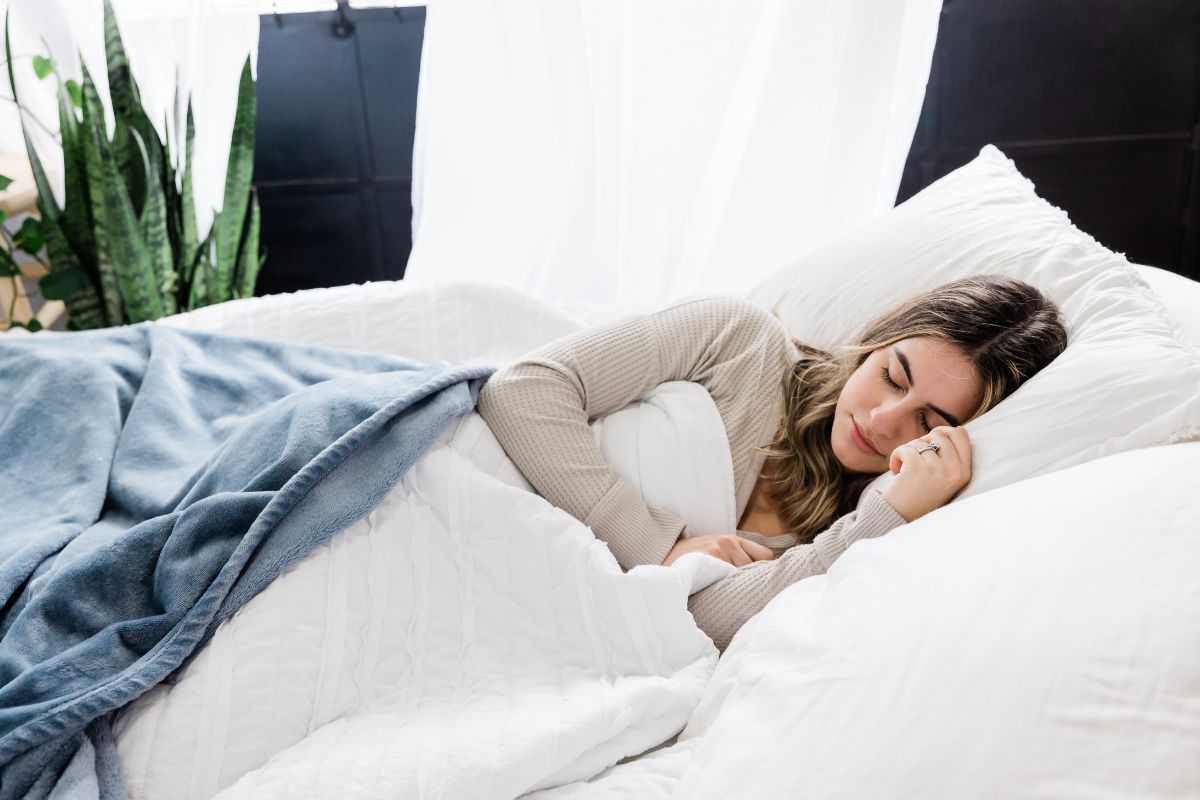The Connection Between Sleep and Mental Health

Sleep and mental health are deeply intertwined. Getting enough restful sleep helps the brain reset and process emotions, while chronic sleep loss can trigger or worsen mood problems. Research shows that even short-term sleep deprivation makes people more emotionally reactive and sensitive to stress. For example, a recent meta-analysis found that any form of sleep loss strongly reduced positive mood and increased anxiety. Likewise, the NIH notes that ongoing sleep deficiency can leave you difficult to focus, solve problems, or control emotions. In practical terms, this means poor sleep often leads to irritability, mood swings, low motivation, and trouble concentrating, as well as a heightened risk of anxiety and depression.
How Poor Sleep Affects Mood, Cognition, and Emotion
-
Mood and emotion: Insufficient sleep tends to lower positive feelings and raise negative ones. One meta-analysis reports that people with sleep loss have significantly more symptoms of anxiety and blunted emotional responses. Similarly, the Mayo Clinic observes that sleep deprivation “can drain your energy level and affect your mood,” leading to feelings of crankiness, anxiety or depression upon waking. NIH explains that sleep helps regulate brain pathways (like connections between the amygdala and prefrontal cortex) that keep emotions in check. Without enough sleep, the brain is less able to inhibit negative reactions, making us more prone to anger or fear.
-
Cognition and memory: Sleep is critical for learning, memory consolidation, and cognitive performance. Reviews consistently show that even one night of poor sleep impairs memory, attention, alertness, and decision-making. For instance, researchers found sleep deprivation “does not occur independently of the effects on memory, attention, alertness, judgment, decision-making… resulting in decreased function and impaired cognitive performance”. Another review notes that chronic sleep loss causes slower reaction times and “an impairment in attentiveness, working memory, [and] consolidation of memories”. In practice, this means you may have trouble concentrating at work or school, forget appointments, or make simple mistakes when you are sleep-deprived.
-
Emotional regulation: Good sleep supports balanced mood and stress tolerance. By contrast, poor sleep makes it harder to calm down from upsetting events. NIH warns that sleep deficiency “can interfere with… managing your emotions and behavior, and coping with change”. In other words, after a bad night’s sleep you’re likelier to overreact to minor frustrations. On the other hand, some studies suggest that improving sleep quality causes improvements in mental health: one meta-analysis of trials found that when people improved their sleep, measures of depression and anxiety declined significantly. Together, the evidence underscores a two-way link: insomnia and stress often feed each other, so breaking the cycle of poor sleep can have immediate mood benefits.
Common Causes of Poor Sleep
Several factors can disrupt sleep and negatively impact mental well-being:
-
Stress and anxiety. Worrying thoughts or high stress levels can keep the brain “highly aroused” at night, making it hard to fall or stay asleep. Conditions like generalized anxiety or PTSD commonly lead to insomnia. As one sleep expert notes, “excess worry and fear make it harder to fall asleep… Sleep deprivation can worsen anxiety, creating a negative cycle”.
-
Irregular schedules or circadian disruptions. Working late shifts, jet lag from travel, or constantly changing bedtime routines can confuse the body’s internal clock. The Mayo Clinic highlights that disrupting circadian rhythms (for example, through shift work or changing time zones) is a common cause of chronic insomnia. Similarly, getting too little daytime light or too much light at night (from screens or lamps) suppresses melatonin. Even dim evening light “throws the body’s biological clock… out of whack,” which directly impairs sleep quality.
-
Poor sleep habits. Certain lifestyle habits promote restless sleep. Going to bed at inconsistent times, napping excessively, or doing stimulating activities in bed (work, TV, smartphone use) can fragment sleep. The CDC recommends turning off electronic devices at least 30 minutes before bed to avoid blue light (which suppresses melatonin). Heavy meals late at night, lack of regular exercise, and using the bed for work or worrying (instead of only sleep and sex) also tend to impair sleep.
-
Medical or mental health conditions. Chronic pain, breathing problems (like sleep apnea), restless legs syndrome, or medications (e.g. some antidepressants, asthma drugs, decongestants) can wake you during the night. Mood disorders are closely linked with sleep issues: depression often causes early waking, and insomnia often occurs alongside anxiety or other mental illnesses. In sum, medical illnesses and psychiatric conditions frequently disrupt sleep.
-
Substance use. Stimulants such as caffeine (in coffee, tea, cola) or nicotine can make it harder to fall asleep, especially if consumed late in the day. Conversely, alcohol may help you nod off faster but leads to fragmented, lighter sleep and mid-night awakenings. Mayo Clinic cautions that “caffeine, nicotine and alcohol…can disrupt sleep” if used too close to bedtime.
-
Environmental factors. A sleep environment that is bright, noisy, or uncomfortable will prevent deep sleep. Ideally the bedroom should be quiet, dark, and cool. Noise (traffic, pets, snoring partners) and light (streetlights, screens) break sleep into lighter stages. Poor bedding, an uncomfortable mattress, or extreme temperatures can also cause awakenings. Addressing environment is an easy fix that can have big effects on sleep quality.
By recognizing these factors, individuals can begin to address the root causes of poor sleep. Implementing stress management (e.g. relaxation or therapy) and healthy sleep habits (sleep schedule, screen curfews, etc.) can mitigate many of the above issues.
Strategies to Improve Sleep Quality
Improving sleep typically requires a multi-faceted approach. The following evidence-based practices can help build better sleep over time:
Sleep Hygiene Practices
-
Keep a consistent sleep schedule. Go to bed and wake up at the same times every day (even on weekends). This reinforces your body’s circadian rhythm. Avoid long afternoon naps, as these can make nighttime sleep harder. Likewise, try to get 7–9 hours of sleep per night (as recommended for adults) by adjusting your bedtime rather than oversleeping in the morning.
-
Limit stimulants and large meals. Avoid caffeine (coffee, tea, energy drinks) after midday and nicotine in the evening. Also avoid heavy or spicy meals close to bedtime, as discomfort or heartburn can wake you.
-
Wind down before bed. Dedicate the last 30–60 minutes before sleep to relaxing activities. Turn off bright screens (TV, computer, phone) at least 30 minutes prior. Instead, do calming rituals: gentle reading, listening to soft music, or taking a warm bath. Even light stretching or a few minutes of meditation can signal to your body that bedtime is approaching.
-
Reserve the bed for sleep. Use the bed only for sleep and (if relevant) sex. If you find yourself tossing for more than ~20 minutes without sleep, get up and do a quiet relaxing activity in another room (reading, breathing exercises), then return to bed when sleepy. This stimulus-control strategy breaks the association of the bed with frustration and trains your brain to see bed as a cue for sleeping.
-
Exercise regularly (but not too late). Regular daytime exercise improves sleep quality, but exercising vigorously right before bedtime can be stimulating. Try to finish any intense workouts at least a few hours before bed. Even a brisk evening walk or gentle yoga can help the body wind down and make falling asleep easier.
Relaxation Techniques
-
Mindfulness and meditation. Practices like mindfulness meditation, deep breathing, and guided imagery can reduce stress and prepare the mind for sleep. In one study, older adults with insomnia who practiced mindfulness meditation for six weeks experienced significantly less insomnia, fatigue, and depression than those who only received sleep education. The “relaxation response” from meditation counteracts the stress response, making it easier to fall asleep.
-
Progressive muscle relaxation. Systematically tensing and relaxing muscle groups (from toes up to the head) can help release physical tension. This technique is simple: at bedtime, squeeze a muscle (like a fist or your shoulders) for a few seconds, then relax and move to the next group. Over a few minutes, this promotes overall relaxation and drowsiness.
-
Breathing exercises. Try inhaling deeply (for count of 4), holding briefly, then exhaling slowly (for count of 6 or 8). Focusing on slow, rhythmic breathing can quiet racing thoughts. For example, the “4-7-8” technique (inhale 4 seconds, hold 7 seconds, exhale 8 seconds) is often recommended to promote calm.
-
Visualization or calm focus. Imagine a peaceful scene or repeat a calming word (like “relax”) with each breath. If your mind wanders to worries, gently bring it back to your breath or image. Even short daily practice of these methods builds a habit of relaxation that can help when stress or insomnia strikes.
-
Journaling (off-loading). Spending 5–10 minutes before bed writing out a to-do list or jotting down worries can “off-load” concerns from your mind. One sleep study found that people who wrote a specific to-do list before sleeping fell asleep significantly faster than those who wrote about completed tasks. This simple technique helps clear your mind so you’re less likely to lie awake rehashing unfinished thoughts.
Cognitive-Behavioral Strategies
-
Cognitive restructuring. Identify and challenge unhelpful thoughts about sleep (e.g. “I’ll never sleep” or “I must be asleep by midnight”). Replace them with more realistic, calming thoughts like “Even if I’m awake, resting quietly is helpful.” Keeping a worry journal during the day or scheduling “worry time” before bed can also reduce anxious thinking at bedtime.
-
Stimulus control. As Mayo Clinic recommends, make the bedroom a strict cue for sleep. This means if you can’t sleep within ~20 minutes, get up and do something relaxing in dim light, returning to bed only when truly tired. Over time, this trains your brain to associate the bed with falling asleep quickly.
-
Sleep restriction. For chronic insomnia, a therapist may suggest a controlled restriction of time in bed (based on your average sleep time) to strengthen sleep drive, then gradually increase it. This helps consolidate fragmented sleep into deeper, more efficient sleep cycles.
-
Keep a sleep diary. Track your bedtime, wake time, naps, caffeine/alcohol use, and sleep quality. This can reveal patterns (for example, that nightly caffeine or late meals are problematic) and also provides a sense of progress. Share the diary with a clinician if you seek help.
Environmental Adjustments
-
Optimize the bedroom. Keep the room dark (blackout curtains or eye mask), quiet (earplugs or a white-noise machine), and cool (around 65°F or 18°C). Remove electronic devices and TVs that emit light or noise. A comfortable mattress and pillows appropriate for your sleep style make a big difference; if your bed is old or lumpy, replacing it can improve sleep in one step.
-
Limit light exposure. Bright light in the evening suppresses melatonin, the hormone that promotes sleep. Harvard researchers note that even dim light can disrupt circadian rhythm and sleep quality. During the day, get plenty of natural light (especially morning sunlight) to reinforce your sleep-wake cycle.
-
Sound control. If noise is an issue (traffic, neighbors, or snoring), use a fan, white-noise machine, or earplugs. Consistent low-level noise often helps people sleep better than sudden silence punctuated by random sounds.
By combining these strategies — keeping a regular schedule, practicing relaxation, modifying thoughts and behaviors around sleep, and creating a sleep-friendly environment — most people will see gradual improvements in sleep quality and mental sharpness.
When to Seek Professional Help
Most sleep problems respond to the above strategies, but professional help is warranted in certain cases:
-
Persistent insomnia. If difficulty sleeping (falling or staying asleep) occurs at least 3 nights per week for 3 months or more, it may be chronic insomnia. This usually requires more intensive treatment. The National Sleep Foundation defines chronic insomnia as 3+ nights/week for ≥3 months and advises that “talking to your doctor about lifestyle changes, cognitive therapy, and…medicines may help”.
-
Daytime impairment. If poor sleep is significantly affecting your daily life (difficulty concentrating, mood swings, frequent accidents, or impaired work performance), consult a healthcare provider. Mayo Clinic recommends seeing a doctor when insomnia “makes it hard for you to do daily activities”. Likewise, the Sleep Foundation notes that if you regularly answer “yes” to questions like “Do I feel tired during the day, even though I slept through the night?” it’s time to see a provider.
-
Sleep disorder symptoms. Some signs point to specific disorders. For example, loud snoring or gasping for air at night suggests sleep apnea, which can have serious health consequences and requires medical evaluation. Restless legs, acting out dreams, or sudden daytime sleep attacks (sleepiness) are other red flags that warrant specialist assessment.
-
Mental health concerns. If insomnia co-occurs with depression, anxiety, or suicidal thoughts, professional help is crucial. Poor sleep both contributes to and worsens mental illness, so treating one often helps the other. Therapists trained in cognitive-behavioral therapy for insomnia (CBT-I) can be especially effective, as studies show CBT-I improves sleep and mood without the side effects of medications.
-
Resistance to self-care. If you’ve consistently practiced good sleep hygiene and relaxation techniques for a few weeks with little improvement, seek help. A sleep specialist or your primary doctor can evaluate for underlying medical issues (thyroid problems, chronic pain, medications, etc.) and discuss options like CBT-I, light therapy, or short-term sleep aids.
In summary, improving sleep involves both understanding its connection to mental well-being and taking practical steps to protect sleep. Good sleep habits, stress reduction, and a peaceful sleep environment will help most people. But if problems persist or you suspect a sleep disorder, early intervention by a doctor or sleep professional can prevent the cycle of insomnia and mood decline from becoming entrenched.






